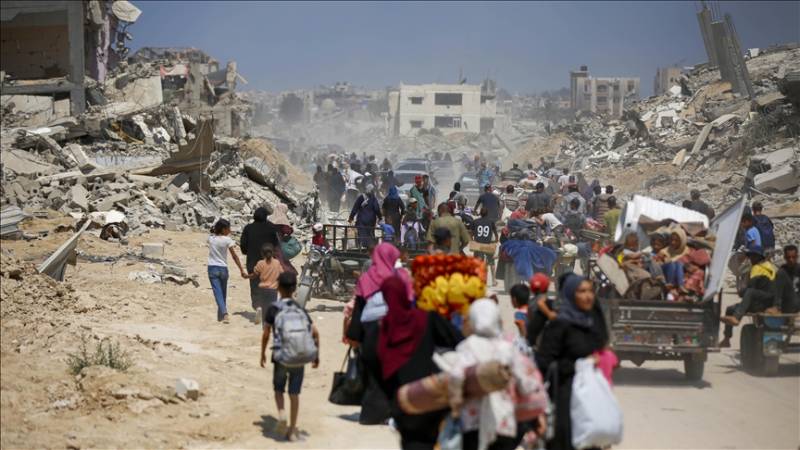Arshad Mahmood Awan
After two years of devastating war, which took the lives of more than 67,000 Palestinians — including thousands of women and children — Gaza lies in ruins. Entire neighborhoods have been flattened, hospitals and schools obliterated, and the very rhythm of life shattered. Amid this destruction, a glimmer of hope emerged on October 9, when Hamas and Israel signed a ceasefire agreement brokered by US President Donald Trump.
The deal promises a phased end to hostilities, starting with the cessation of Israeli bombardment, a partial withdrawal of Israeli forces from Gaza, and a prisoner exchange — freeing Israeli hostages captured during the October 7, 2023 attacks in exchange for hundreds of Palestinians held in Israeli prisons. Trump has hailed the accord as a first step toward “lasting peace,” but the optimism in Gaza is overshadowed by deep anxiety. For Palestinians, Israel’s track record of violating agreements and exploiting minor pretexts to resume aggression is a painful reminder that peace can vanish overnight.
It now falls on Washington to prove whether this ceasefire represents genuine diplomacy or yet another episode of political theatre. The United States must ensure the uninterrupted flow of humanitarian aid — food, medicine, and shelter — into Gaza, and pressure Tel Aviv to honor its commitments. Yet skepticism persists: can America act as an honest broker when it has long aligned itself unconditionally with Israel’s political and military agendas?
Even as the guns fall silent, the ceasefire faces numerous pitfalls. Disagreements have already surfaced regarding the list of Palestinian prisoners to be released, with Israel reportedly refusing to free key political figures. More troubling is Israel’s reported plan to retain control over 53 percent of Gaza’s territory, keeping its forces stationed along a so-called “security line.” Such a move undermines the very essence of withdrawal and sets the stage for renewed confrontation. Any miscalculation — or pretext manufactured by Tel Aviv — could reignite hostilities, turning the truce into another broken promise.
Moreover, this agreement appears structurally biased in Israel’s favor. President Trump’s broader 20-point plan, revealed earlier this month, reflects Israel’s priorities while minimizing Palestinian agency. Instead of a roadmap to justice, it reads like a blueprint for control — preserving Israel’s dominance under the guise of peace. For Gaza, where every street bears scars of airstrikes and every family mourns lost children, such a skewed settlement offers little solace.
Still, even a temporary cessation of violence brings desperately needed relief to a people who have endured the unimaginable. After years of siege, starvation, and bombardment, Gazans can finally bury their dead, tend to their wounded, and rebuild fragments of what remains. It is a moment of fragile calm in a region that has seen none for decades.
The war’s expansion beyond Gaza had already set the entire Middle East on edge. Israeli strikes and regional reactions from Lebanon, Yemen, Iran, and Qatar turned the conflict into a geopolitical crisis. As Israel’s military adventurism clashed with Iran-backed groups and Arab solidarity movements, the specter of a wider war loomed large. In this context, even a fragile ceasefire represents a collective exhale across the region.
Yet true peace remains elusive. The agreement’s flaws lie not just in its temporary design but in its disregard for the fundamental political question — the future of a Palestinian state. Without addressing Palestinian sovereignty, self-determination, and justice for war crimes, no accord can deliver stability. The plan’s proposed “Board of Peace”, an unelected body reportedly including figures like Tony Blair, symbolizes external interference rather than empowerment. Such arrangements reduce Palestinians to spectators in their own struggle for nationhood.
History shows that peace imposed from above rarely endures. The Oslo Accords, the Camp David process, and countless UN resolutions have collapsed under the weight of Israeli expansionism and global indifference. What Gaza needs is not another “temporary pause” but a just settlement guaranteeing its people dignity, safety, and sovereignty.
In the end, two conditions remain non-negotiable: accountability for the genocide in Gaza and the recognition of a sovereign Palestinian state. Until these are met, the ceasefire — however welcome — is merely a humanitarian interval, not a political breakthrough. For the children of Gaza who grew up under bombs, peace cannot be an illusion scripted in Washington or Tel Aviv. It must be built on justice, equality, and the unyielding truth that Palestinian lives are not bargaining chips but human lives worthy of freedom.
















